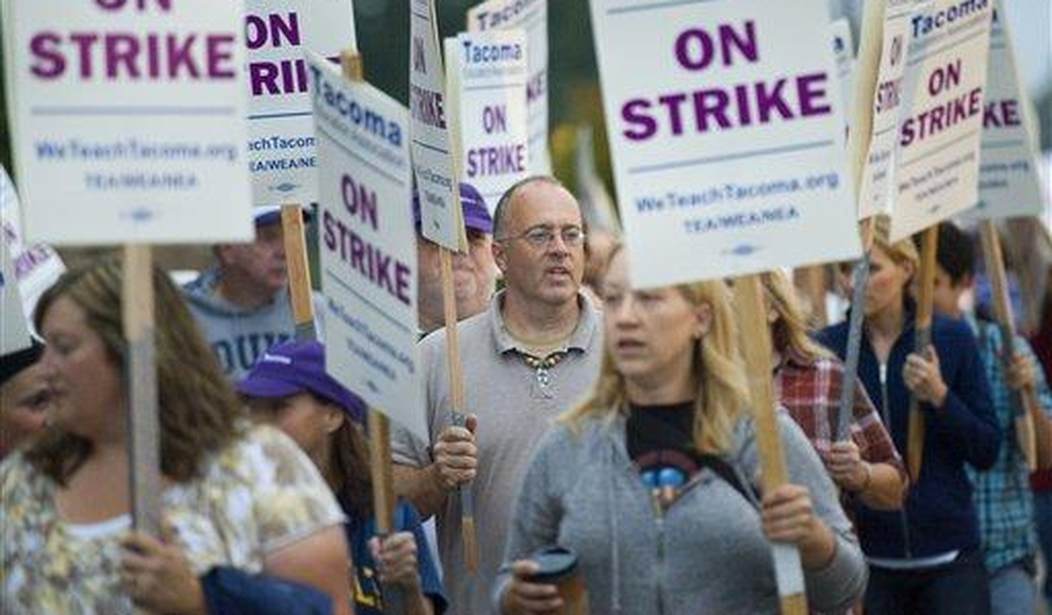School officials in Massachusetts canceled classes in two cities on Monday as a result of a teachers strike over salaries, class sizes and school environments.
Teachers in the cities of Malden and Haverhill began striking on Monday, forcing thousands of students to stay home from school. This came after hours of negotiations over the weekend (via WCVB):
The president of the Malden Education Association, Deb Gesualdo, said that teachers will be on strike Monday after spending nearly 11 hours at the negotiating table with the Malden School Committee on Sunday alone.
On Monday morning, teachers were demonstrating with signs outside the high school.
"Since they have walked away from the table while we were still ready to bargain and our membership voted overwhelmingly on Friday to authorize this strike, if there was no agreement in writing by Sunday evening, the Malden Education Association members are on strike," Gesualdo said.
Gesualdo said both sides went back and forth on salary and that the union came down on their demands and felt close to a deal before the School Committee's negotiating subcommittee called for a mediator and walked out for the night.
"We're at an impasse. We're going to request the assistance of the Division of Labor Relations and request that the division assign up a mediator to continue these negotiations," said school department attorney Howard Greenspan.
“Whose schools? Our schools!”
— Julianne Lima (@JulianneLimaTV) October 17, 2022
Teachers and staff chanting outside Malden High School as day one of their strike gets underway.
A union negotiator tells me the district has not given them a date for their next negotiation session@boston25 pic.twitter.com/yW6h0ct4rn
In Haverhill, negotiations are expected to resume on Monday. WCVB noted that teacher strikes are illegal in Massachusetts because state law prohibits strikes by public employees.
Recommended
"If they come to the table with a good deal, our team will sign it. I hope it's tonight," said Barry Davis, first vice president of the Haverhill Education Association, told the outlet. "But if we have to be on the (picket) line tomorrow, we will be."
A member of the Haverhill School Committee reportedly said that they offered the teachers the highest raise city educators have had in 20 years.
"While some progress was made over the last few days, we are extremely disappointed that union leadership and the Massachusetts Teachers Association has encouraged our teachers to take this illegal action," a statement from the Haverhill Negotiations Subcommittee said.
Last month, Townhall covered how teachers unions across the country went on strike over salaries and working conditions, such as air conditioning in schools. The strikes came as a report from the National Assessment of Educational Progress showed that students lost 30 years of learning in the two years that students were home during the pandemic, which Leah covered. Average 9-year-old scores declined the most on record for math (seven points) and in reading since 1990 (five points).
To recap, in Columbus, Ohio, teachers went on strike over class sizes and building conditions, such as ventilation, delaying the school year for about 50,000 students. Teachers in Seattle and nearby suburb Kent went on strike over wages and class sizes as a result of staffing issues. About 2,000 service employees within the Philadelphia School District voted to authorize a strike over wages and training conditions.
However, funds allocated to public schools through the American Rescue Plan (ARP) were intended to rectify these issues. The U.S. Department of Education outlined on its website last year that ARP funds could be used to improve air quality for school buildings, including projects to repair or replace heating, ventilation and air conditioning systems. The APR provided $122 billion for the Elementary and Secondary Schools Emergency Relief (ESSER) Fund to help schools combat the spread of COVID-19. Other funds from the Governor’s Emergency Education Relief (GEER) and Higher Education Emergency Relief (HEER) also supported this type of work.
However, a report from the U.S. Centers for Disease Control and Prevention found that most public schools made “no major investments” in improving indoor ventilation with the funds they received in COVID-19 relief. The report found that less than 40 percent of public schools replaced or upgraded their HVAC systems, many of which were outdated or nonexistent.
And, these funds were meant to also address the issue of teacher shortages. ARP funds were permitted to be used to raise wages, rehire retired teachers, hire resident visiting teachers on standby in the event a colleague is sick with COVID-19, offer bonuses to qualified individuals who obtain a substitute teaching license and create sign-on bonuses for new teachers.
In December, Education Secretary Miguel Cardone urged school districts to act with “urgency” to use the COVID-19 relief funds to retain teachers and hire more staff.
“ARP provides vital resources to hire additional educators and school staff and to improve compensation to recruit and retain educators and school staff. School districts should act with urgency to keep schools open for in-person learning and ensure they do not waste this opportunity to make critical investments,” the letter added.
Despite this, teachers across the country are continuing to go on strike. Townhall has also covered lower academic performance, chronic absenteeism and mental health challenges that have become prevalent among students since the pandemic.

























Join the conversation as a VIP Member